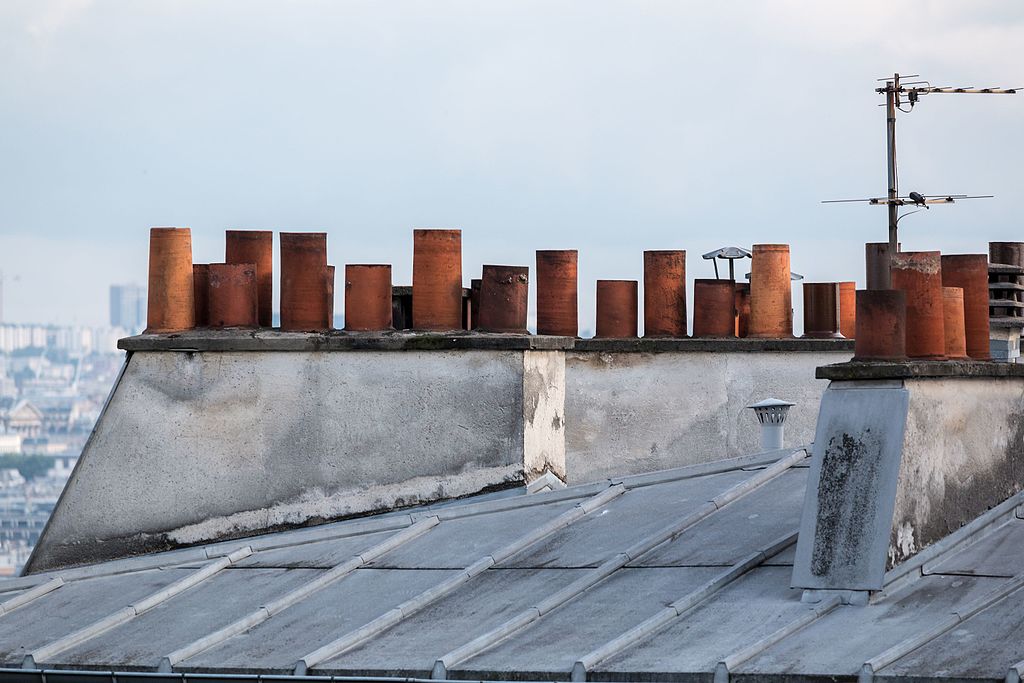
“Pale blue sky beyond anarchy of chimney pots,” writes Gail Scott. Photograph of chimneys in Montmartre by Dietmar Rabich. LICENSED UNDER CC BY-SA 4.0.
I first encountered Gail Scott’s sentences in Calamities, a book of glorious short essays by Renee Gladman, one of Scott’s closest readers. “These were the shortest sentences I’d ever seen,” Gladman writes, “yet they were not the kind of sentences that allowed you to rest when you reached the end of them. They pointed always to the one up ahead … They pushed you off a balcony; they caused fissures in your reading mind.” When I finally read Scott, it was two novels back to back: Heroine, a young lesbian’s feverish account of living in a Montreal boarding house in the early eighties, and My Paris, the precisely calibrated diaries of an often depressed Quebecois woman living in Paris. It was easy to see how you might want to live in Scott’s sentences forever, or, as Gladman did, transcribe them from memory onto your living room wall. I read them again and again for the pleasure of pure description; for the unnamed women who move through them without warning, wearing loose black pants, an olive-green jumpsuit, silk socks, and irrepressible perfume; for Scott’s impressions of Quebecois political-left consciousness in the second half of the twentieth century. “Heroine is more a work of reading than of writing,” Eileen Myles wrote in the book’s introduction, which was also published by the Review in 2019. It’s the deceptive work of accumulation, too, that drives both these novels—in the kind of ravenous prose that seems to revise itself as it’s already in motion. From My Paris: “The marvellous is to be had. I thinking at 5:30a. Looking out window. Pale blue sky beyond anarchy of chimney pots. You just have to pierce the smugness of the surface.”
—Oriana Ullman, intern
“History repeats itself.” This repetition, the relentless circularity of time, is the subject of Time Shelter, the latest novel by the Bulgarian writer Georgi Gospodinov, translated by Angela Rodel. It follows an unnamed Bulgarian narrator as he finds himself drawn into the creation of a Zurich-based “clinic of the past” for Alzheimer’s patients, dreamed up by Gaustine, a philosopher prone to uttering enigmatic sentences like, “No one has yet invented a gas mask and bomb shelter against time.” The clinic is neatly divided into floors, each of which is dedicated to a decade of the patients’ lives—but these floors eventually begin to spill over into one another. Mayhem ensues. Soon, nonpatients want in, too, and politics enters the scene. Referendums are held: Should Europe be returned to its past? Strewn with aphoristic meditations on the history, fiction, the nature of time, and the construct of Europe, this is a novel that feels both prescient and like a dream. Or like a moment of déjà vu: At the book’s end, is it 1914 in Sarajevo, a time and place that decided the course of modernity as we know it—or is it a reenactment of that assassination, happening in 2024? At what point does that which is reenacted merge with that which is real? As Gospodinov illustrates, it’s pointless to bet against the past. The house always wins.
—Rhian Sasseen, engagement editor
I’ve been spending some time with Harmony Holiday’s startling new book of poetry, Maafa, which is both verbally dense and free-flowing, terrifying and moving. Maafa is a Swahili word for “catastrophe” or “holocaust,” and the book’s lyric sequences are preoccupied with questions of how to understand, represent, and maybe even channel the overwhelming history of violence against Black lives. From Holiday’s vantage, the answers are by no means simple—at one point, a voice exclaims, “I’m reluctant to write this shit.” The difficulty of doing a catastrophe justice is entwined with the further tragedy of its potential co-option. The result is a field of fragments that oscillates between Ancient Egypt and “Fenty / Beauty ambassador”: destabilized but driven, at war with itself and with the narcotic of easy narratives, and ultimately visionary in its search.
Black music is a recurring subject in Holiday’s writing, and the book calls on a pantheon of sonic ancestors: Lena Horne, Sun Ra, Al Green, Bone Thugs-n-Harmony. They are the points of contact by which a stolen history might be clawed back: “black music is the music of forensics // all my dead friends come to me as songs.” Resurfacings of stark violence crash into quicksilver wordplay: Holiday’s language is always restless as it cascades over itself, mischievous and never quite pin-downable, like the theme of a jazz chart that is taken up and reinvented in improvisation. The words run across the page in staggered spacings, as though written by a musician trying to hold the rhythm of the sentence in her pocket. Survival, Holiday tells us, is an ongoing struggle, something that is fought for between every word.
—David Wallace, advisory editor
from The Paris Review https://ift.tt/5uzsVIw
Comments
Post a Comment